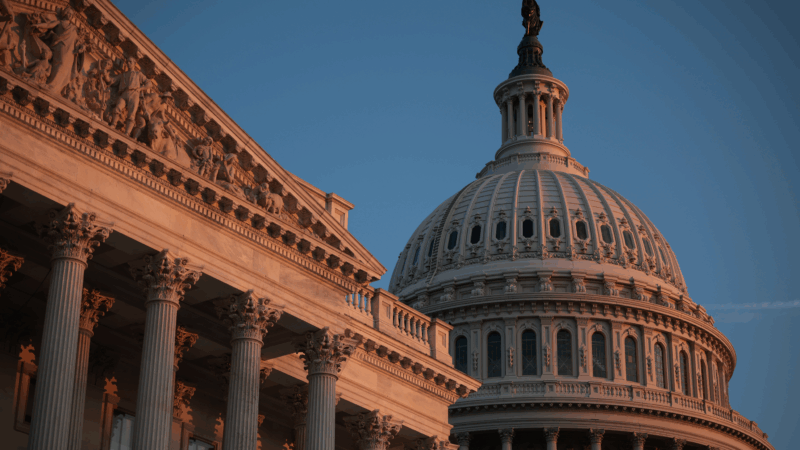House Republicans pass Trump’s megabill, sending the package to his desk to be signed
President Trump’s massive spending and tax cut bill is on the way to his desk for a signature. The bill passed Thursday after Republican leaders in the House of Representatives convinced holdouts in their own party to get in line behind the controversial legislation.
House Republicans passed the bill by a vote of 218 to 214, nearly entirely along party lines. All 212 Democrats voted in unison against the bill, and they were joined by two Republicans, Reps. Thomas Massie of Kentucky and Brian Fitzpatrick of Pennsylvania. Leaders were forced to work all night to win the votes necessary to pass the bill and meet Trump’s demand to sign the bill by July 4.
House Speaker Mike Johnson, R-La., pledged in a speech on the House floor that the bill would make the U.S. “stronger, safer and more prosperous than ever before.”
“Today we are laying a key cornerstone of America’s new golden age,” he said.
The sprawling GOP bill — clocking in at nearly 1,000 pages — represents a dramatic realignment of the federal government’s role in American life, shifting resources from the social safety net and investments in clean energy, and reorienting them to finance trillions of dollars in new spending on tax cuts, immigration enforcement and national defense.
Trump was heavily involved in selling the bill to skeptical lawmakers, including calling them to the White House for talks throughout the day on Wednesday.
Trump also weighed in repeatedly on social media throughout the night, demanding that lawmakers finish the job.
“Largest Tax Cuts in History and a Booming Economy vs. Biggest Tax Increase in History, and a Failed Economy. What are the Republicans waiting for??? What are you trying to prove??? MAGA IS NOT HAPPY, AND IT’S COSTING YOU VOTES!!!” Trump wrote just after midnight.
The legislative effort fulfills key campaign pledges that Trump made during his reelection bid — including making hefty tax cuts passed during his first term permanent. But it violates a key promise too: Trump promised repeatedly during the campaign not to touch Medicaid benefits, the joint federal and state program that provides health care for more than 70 million low-income, elderly and disabled Americans.
Republicans say they are targeting waste, fraud and abuse in the program, and the bill makes significant changes to work requirements and ways the program is funded. The Congressional Budget Office, a nonpartisan group of professional staffers who provide information and analysis to support the legislative process, estimates that the cuts could result in nearly 12 million people losing health coverage.
Democrats rallied against the bill but could not block or change it
Democrats warned throughout the day and night that the legislation contains major cuts to the social safety net, including food aid and insurance coverage for millions of Americans.
Before the vote, House Minority Leader Hakeem Jeffries, D-N.Y., spoke on the House floor for 8 hours and 44 minutes in a wide-ranging speech, railing against Republicans and the impact of the bill.
The speech broke the record for the longest leadership speech in the history of the House of Representatives. The previous record, of 8 hours, 32 minutes, was set by then-House Minority Leader Kevin McCarthy, R-Calif., in 2021.
During the speech, Jeffries read letters from people insured through Medicaid, including many who said they live in congressional districts represented by Republicans. Jeffries called the bill “an immoral document.”
“Everybody should vote no against it because of how it attacks children and seniors and everyday Americans. And people with disabilities,” Jeffries said. “That is why I stand here on the floor of the House of Representative with my colleagues in the House Democratic caucus to stand up and push back against it with everything we have.”

The package also comes with a hefty price tag. The Congressional Budget Office estimates the bill will increase the deficit — how much money the government spends over the amount it brings in — by $3.4 trillion over 10 years.
These issues were the focus of significant debate during both Senate and House deliberations over the bill. The House passed an initial version in late May, although it changed in the Senate as lawmakers incorporated additional cuts to Medicaid and a higher increase to the debt limit.
Republican concerns dragged negotiations through the night
The Senate passed its updated bill on Tuesday and sent it back to the House, which then needed to approve the same text to move it forward.
Much like in the Senate, House GOP leaders then had to work with conflicting factions of the conference to get enough lawmakers on board, particularly those concerned about Medicaid changes and conservative fiscal hawks who wanted to see more savings.
Republican holdouts in the House slowly got on board with the bill throughout Wednesday evening into Thursday.
Before the vote, House Speaker Mike Johnson told reporters that many previously opposed lawmakers had needed a “reasonable” amount of time to understand the Senate changes.
“I gave them the space to do it,” he said, adding, “The president helped answer some questions. We got Cabinet secretaries involved and experts in all the fields, and they got their questions answered.”
Members of the conservative House Freedom Caucus, including Rep. Ralph Norman, R-S.C., echoed that sentiment on Wednesday in between discussions, telling reporters that the meeting at the White House was “very helpful.”
“[There] won’t be any vote until we get satisfied,” Norman said, before ultimately announcing he would support the bill later that evening. “What I want to know is … what actions we can put in place, that the president and his team can do, to make sure we have our questions answered.”
However, when reporters asked Johnson Thursday morning about any potential executive actions the president pledged to take to address concerns from conservatives, the speaker said he wasn’t clear on any details. “I know there was a lot of talk about how the bill would be implemented and what role the executive would have.”
Johnson said he was planning to move another reconciliation package in the fall and in the early spring to address items that were not included in this package.
Asked whether he was trying to win over Rep. Brian Fitzpatrick, R-Pa., who opposed the procedural measure to bring up the bill, Johnson said, “I’ve certainly tried to encourage him to get to a yes.”
The speaker admitted he had not gotten any sleep. “Can you tell?” he joked to reporters.
Final passage of the legislation came just one day ahead of a self-imposed GOP deadline to have the bill on the president’s desk by July 4. Trump has been a constant presence throughout the process for Republicans, pressuring members to strike a deal and threatening to support primary challengers to lawmakers who oppose it.
Team USA faces tough Canadian squad in Olympic gold medal hockey game
In the first Olympics with stars of the NHL competing in over a decade, a talent-packed Team USA faces a tough test against Canada.
PHOTOS: Your car has a lot to say about who you are
Photographer Martin Roemer visited 22 countries — from the U.S. to Senegal to India — to show how our identities are connected to our mode of transportation.
Looking for life purpose? Start with building social ties
Research shows that having a sense of purpose can lower stress levels and boost our mental health. Finding meaning may not have to be an ambitious project.
Sunday Puzzle: TransformeR
NPR's Ayesha Rascoe plays the puzzle with listener Joan Suits and Weekend Edition Puzzlemaster Will Shortz.
Danish military evacuates US submariner who needed urgent medical care off Greenland
Denmark's military says its arctic command forces evacuated a crew member of a U.S. submarine off the coast of Greenland for urgent medical treatment.
Only a fraction of House seats are competitive. Redistricting is driving that lower
Primary voters in a small number of districts play an outsized role in deciding who wins Congress. The Trump-initiated mid-decade redistricting is driving that number of competitive seats even lower.






